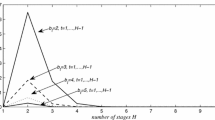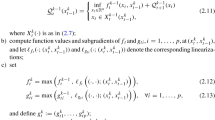Abstract
This paper considers bounding techniques within multistage stochastic programmingand their computational issues. First, a brief overview of bound‐based approximations isprovided within the context of two‐stage stochastic programs. Then, a new methodology forapproximating multistage stochastic programs is developed using a process called non‐anticipativityaggregation. The method advocates relaxing nonanticipativity requirementsof the decisions up to a certain second‐order aggregation to compute lower bounds. Then,this relaxation is refined progressively towards solving the stochastic program. Preliminarycomputational results are presented.
Similar content being viewed by others
References
J.R. Birge, An L-shaped method computer code for multistage linear programs, in: Numerical Techniques for Stochastic Optimization, eds. Y. Ermoliev and R.J-B Wets, Springer, 1988.
J.R. Birge, C.J. Donohue, D.F. Holmes and O.G. Svintsitsli, A parallel implementation of the nested decomposition algorithm for multistage stochastic linear programs, Technical Report 94–1, Department of Industrial and Operations Engineering, University of Michigan, 1994.
J.R. Birge and S.W. Wallace, A separable piecewise linear upper bound for stochastic linear programs, SIAM Journal on Control and Optimization 26(1988)725–739.
J.R. Birge and R.J-B Wets, Designing approximation schemes for stochastic optimization problems, in particular for stochastic programs with recourse, Mathematical Programming Study 27(1986)54–102.
J.R. Birge and R.J-B Wets, Sublinear upper bounds for stochastic programs with recourse, Mathematical Programming 43(1989)131–149.
D.R. Cariño, D.H. Myers, and W.T. Ziemba, Concepts, technical issues, and uses of the Russell-Yasuda Kasai financial planning model, Operations Research 46(1998)450–462.
G.B. Dantzig and P.W. Glynn, Parallel processors for planning under uncertainty, Annals of Operations Research 22(1990)1–21.
M.A.H. Dempster, The expected value of perfect information in the optimal evolution of stochastic systems, in: Stochastic Differential Systems, eds. M. Arato, D. Vermes, A.V. Balakrishnan, Lecture Notes in Control and Information Sciences, 1981, pp. 25–40.
J.H. Dula, An upper bound on the expectation of simplicial functions of multivariate random variables, Mathematical Programming 55(1992)69–80.
J. Dupačová (as Žáčková), On minimax solutions of stochastic linear programming problems, Časopis Pro Pětováni Matematiky 91(1966)423–430.
J. Dupačová, Minimax stochastic programs with nonconvex nonseparable penalty functions, in: Progress in Operations Research, ed. A. Prékopa, North-Holland, Amsterdam, 1976, pp. 303–316.
J. Dupačová, Multistage stochastic programs: The state-of-the-art and selected bibliography, Kybernetika 2(1995)151–174.
J. Dupačová, Scenario-based stochastic programs: Resistance with respect to sample, Annals of Operations Research 64(1996)21–38.
N.C.P. Edirisinghe, New second-order bounds on the expectation of saddle functions with applications to stochastic linear programming, Operations Research 44(1996)909–922.
N.C.P. Edirisinghe, Partitioning strategies for scenario approximation in SLP, Working paper, University of Tennessee, 1998.
N.C.P. Edirisinghe and W.T. Ziemba, Tight bounds for stochastic convex programs, Operations Research 40(1992)660–677.
N.C.P. Edirisinghe and W.T. Ziemba, Bounds for two-stage stochastic programs with fixed recourse, Mathematics of Operations Research 19(1994)292–313.
N.C.P. Edirisinghe and W.T. Ziemba, Bounding the expectation of a saddle function with application to stochastic programming, Mathematics of Operations Research 19(1994)314–340.
N.C.P. Edirisinghe and W.T. Ziemba, Implementing bounds-based approximations in convex-concave two-stage stochastic programming, Mathematical Programming 19(1996)314–340.
N.C.P. Edirisinghe and G-M. You, Second-order scenario approximation and refinement in optimization under uncertainty, Annals of Operations Research 64(1996)143–178.
N.C.P. Edirisinghe and G-M. You, Scenario approximation in multistage stochastic programming: The case of nonstochastic tenders, Working paper, University of Tennessee, 1998.
Y. Ermoliev, Stochastic quasigradient methods and their application to systems optimization, Stochastics 9(1983)1–36.
Y. Ermoliev and A. Gaivoronsky, Stochastic quasigradient methods and their implementation, in: Numerical Techniques for Stochastic Optimization, eds., Y. Ermoliev and R.J-B Wets, Springer, 1988.
Y. Ermoliev and R.J-B Wets, Numerical Techniques for Stochastic Optimization, Springer, 1988.
K. Frauendorfer, SLP problems: Objective and right-hand side being stochastically dependent — Part II, Manuscript, IOR, University of Zurich, 1988.
K. Frauendorfer, Stochastic Two-Stage Programming, Springer, Berlin, 1992.
K. Frauendorfer, Barycentric scenario trees in convex multistage stochastic programming, Working Paper, University of St. Gallen, 1993.
K. Frauendorfer, Multistage stochastic programming: Error analysis for the convex case, Zeitschrift für Operations Research 39(1994)93–122.
K. Frauendorfer and P. Kall, A solution method for SLP problems with arbitrary multivariate distributions — The independent case, Problems of Control and Information Theory 17(1988)177–205.
H.I. Gassmann, MSLiP: A computer code for the multistage stochastic linear programming problem, Mathematical Programming 47(1990)407–423.
H.I. Gassmann and S.W. Wallace, Solving linear programs with multiple right-hand sides: Pricing and ordering schemes, Annals of Operations Research 64(1996)237–259.
H.I. Gassmann and W.T. Ziemba, A tight upper bound for the expectation of a convex function of a multivariate random variable, Mathematical Programming Study 27(1986)39–53.
J.L. Higle and S. Sen, Stochastic decomposition: an algorithm for two-stage stochastic linear programs with recourse, Mathematics of Operations Research 16(1991)650–669.
C.C. Huang, W.T. Ziemba and A. Ben-Tal, Bounds on the expectation of a convex function of a random variable: With applications to stochastic programming, Operations Research 25(1977)315–325.
G. Infanger, Monte Carlo (Importance) sampling within a Benders decomposition algorithm for stochastic linear programs extended version: including results of large-scale programs, Technical Report SOL 91–6, Stanford University, 1991.
P. Kall, An upper bound for SLP using first and total second moments, Annals of Operations Research 30(1991)267–276.
P. Kall, Stochastic programming with recourse: Upper bounds and moment problems, A review, in: Advances in Mathematical Optimization, eds. J. Guddat et al., Akademie Verlag, Berlin, 1988.
P. Kall and D. Stoyan, Solving stochastic programming problems with recourse including error bounds, Mathematische Operationsforschung und Statistik, Series Optimization 13(1982)431–447.
A. Madansky, Bounds on the expectation of a convex function of a multivariate random variable, Annals of Mathematical Statistics 30(1959)743–746.
D.P. Morton and R.K. Wood, Restricted-recourse bounds for stochastic linear programming, Operations Research (1998), to appear.
J.M. Mulvey and H. Vladimirou, Applying the progressive hedging algorithm to stochastic generalized networks, Annals of Operations Research 31(1991)399–424.
R.T. Rockafellar and R.J-B Wets, Scenarios and policy aggregation in optimization under uncertainty, Mathematics of Operations Research 16(1991)119–147.
A. Ruszczyński, A regularized decomposition method for minimizing a sum of polyhedral functions, Mathematical Programming 35(1986)309–333.
A. Ruszczyński, Parallel decomposition of multistage stochastic programming, Mathematical Programming 58(1993)201–228.
R. Van Slyke and R.J-B Wets, L-shaped linear programs with application to optimal control and stochastic optimization, SIAM Journal on Applied Mathematics 17(1969)638–663.
H. Vladimirou, R.J-B Wets and S.A. Zenios (eds.), Models for planning under uncertainty, Annals of Operations Research 59(1995).
S.W. Wallace, A piecewise linear upper bound on the network recourse function, Mathematical Programming 38(1987)133–146.
Rights and permissions
About this article
Cite this article
Edirisinghe, N. Bound‐based approximations in multistage stochasticprogramming: Nonanticipativity aggregation. Annals of Operations Research 85, 103–127 (1999). https://doi.org/10.1023/A:1018961525394
Issue Date:
DOI: https://doi.org/10.1023/A:1018961525394




